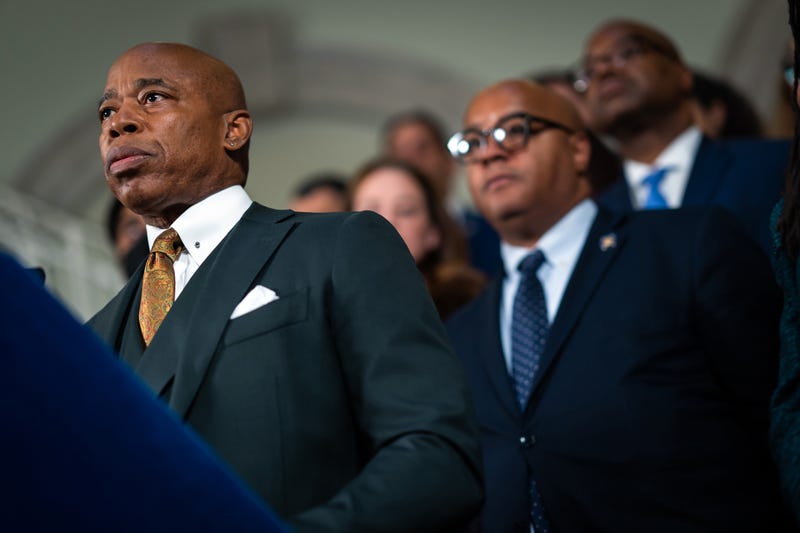
NEW YORK (1010 WINS) — The New York Civil Liberties Union on Tuesday denounced Mayor Eric Adams plan to address mental illness, which centers around the expansion of involuntary hospitalization for people struggling with mental health issues.
The new initiative, which Adams announced at a press conference on Tuesday, will allow police and EMS to forcibly hospitalize people undergoing mental health crises even if they pose no immediate danger to themselves or others.
“These New Yorkers and hundreds of others like them are in urgent need of treatment, yet often refuse it when offered,” said Adams. “The very nature of their illnesses keeps them from realizing they need intervention and support. Without that intervention, they remain lost and isolated from society, tormented by delusions and disordered thinking. They cycle in and out of hospitals and jails. But New Yorkers rightly expect our city to help them. And help them we will.”
Civil rights advocates worry an expansion of involuntary hospitalization could infringe New Yorkers’ constitutional rights.
“The Mayor is playing fast and loose with the legal rights of New Yorkers and is not dedicating the resources necessary to address the mental health crises that affect our communities,” said NYCLU Executive Director Donna Lieberman. “The federal and state constitutions impose strict limits on the government’s ability to detain people experiencing mental illness – limits that the Mayor’s proposed expansion is likely to violate.”
The NYCLU also took issue with the efficacy of the policy, suggesting that forced hospitalization can alienate ailing patients from the long-term care needed to improve mental health outcomes.
“Forcing people into treatment is a failed strategy for connecting people to long-term treatment and care,” said Lieberman. “Unless we adequately invest in the long-term health and well-being of New Yorkers facing mental illness and our chronic lack of housing, the current mental health crisis will continue. The decades-old practice of sweeping deep-seated problems out of public view may play well for the politicians, but the problems will persist – for vulnerable people in desperate need of government services and for New Yorkers.”
The Adams administration did promise to implement long-term care plans for those hospitalized, and said discharge from hospitals will be contingent on plans for continued care.
“We will be enrolling appropriate people living in shelter into specialized Medicaid managed, long-term care plans,” said Adams. “This will offer them enhanced services with the goal of stabilizing their medical condition, increasing connection to healthcare services, reducing hospitalization, and increasing access to community housing. We are adding more support to connection centers and increasing investments in other community support options.”
The Legal Aid Society joined a group of other New York City public defenders in praising Adams’ stated commitment to long-term rehabilitation at Tuesday’s press conference, but stopped short of endorsing the expansion of forced hospitalizations.
“We are heartened to hear that Mayor Adams acknowledges that community-based treatment and least-restrictive services must guide the path to rehabilitation and recovery,” said the public defender groups in a joint statement. “He is correct that homeless New Yorkers with mental health conditions have the right to health care, housing, treatment, respect, dignity and the hope that their futures will be safe and illnesses treated.”
The groups used Adams’ new initiative to call on the mayor to support the Treatment Not Jail Act, a piece of statewide legislation currently in committee in the State Senate.
The law would expand mental health treatment-based alternatives to prison sentences, eliminate charge-based exclusions from mental health treatment programs and allow defendants to opt into treatment without pleading guilty.
Adams has been a firm opponent of policies that allow for alternatives to incarceration like the 2019 New York bail reform law, which eliminated cash bail for most misdemeanors and non-violent felonies.
Bail reform is not linked to an increase in crime, according to a March study from the Brennan Center, and rarely leads to re-arrest, according to an Albany Times-Union report, but Adams has repeatedly blamed the law for rising crime rates in New York City.



